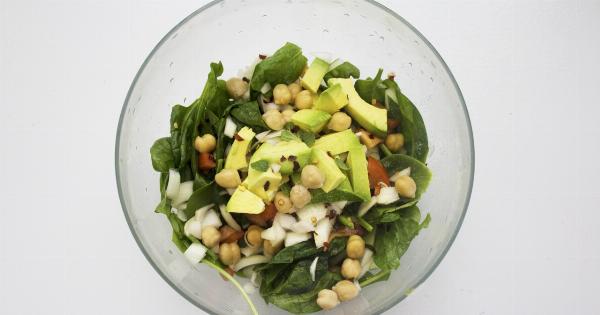Whether you’re trying to lose weight or simply maintain a healthy diet, salads are a great way to pack in a variety of essential nutrients without sacrificing taste.
Salads are versatile, easy to prep, and can be made with a variety of ingredients to suit any dietary need or preference. Not only are salads delicious and filling, but they also offer numerous health benefits, especially when it comes to heart health.
Why Salads are Great for Heart Health
Eating a salad every day is a simple and effective way to promote heart health. Here are some of the ways in which salads can benefit your heart:.
Low in Calories and High in Nutrients
Most salads are low in calories but high in nutrients, making them an excellent choice for those trying to lose weight or maintain a healthy weight.
When salads are made with nutrient-dense foods such as leafy greens, veggies, fruits, and lean protein, they offer plenty of vitamins, minerals, and antioxidants that are essential for heart health.
Loaded with Fiber
Fiber is an essential nutrient that plays a crucial role in heart health. Soluble fiber, in particular, has been shown to help lower cholesterol levels, reduce blood pressure, and reduce inflammation in the body.
Eating a salad every day can help you meet your daily fiber needs and keep your heart healthy.
Rich in Healthy Fats
The right kinds of fats are crucial for heart health. Most salads contain healthy fats such as olive oil, avocado, nuts, and seeds that can help reduce your risk of heart disease.
These fats can also help promote healthy cholesterol levels and lower inflammation.
Ingredients for Heart-Healthy Salads
If you’re looking to make a heart-healthy salad, there are plenty of ingredients you can include to boost its nutritional value. Here are some of the best ingredients to add:.
Leafy Greens
Leafy greens are packed with nutrients such as vitamins A, C, and K, as well as fiber, iron, and calcium. Some of the best leafy greens to add to your salad include spinach, kale, arugula, and mixed greens.
Colorful Veggies
Vegetables add flavor, texture, and nutritional value to your salad. Some of the best veggies to add include tomatoes, carrots, cucumber, bell peppers, radishes, and beets.
Healthy Fats
Healthy fats such as avocado, nuts, seeds, and olive oil are an excellent source of fiber, vitamins, minerals, and antioxidants. Adding these fats to your salad can help reduce your risk of heart disease and improve your overall health.
Lean Protein
Protein helps keep you full and satisfied and is essential for muscle growth and repair. Some of the best sources of lean protein to add to your salad include chicken, fish, tofu, chickpeas, and lentils.
Delicious Heart-Healthy Salad Recipes
Spinach, Strawberry, and Almond Salad
Ingredients:.
- 4 cups of Baby Spinach
- 1 cup of sliced Strawberries
- 1/4 cup of sliced Almonds
- 1/4 cup of crumbled Feta Cheese
- 2 tablespoons of Balsamic Vinegar
- 1 tablespoon of Olive Oil
Directions:.
- Wash and dry the spinach leaves.
- Add the spinach leaves, sliced strawberries, sliced almonds, and crumbled feta cheese to a bowl.
- In a small bowl, whisk together the balsamic vinegar and olive oil.
- Pour the dressing over the salad and toss to combine.
- Serve and enjoy!
Avocado, Tomato, and Cucumber Salad
Ingredients:.
- 2 ripe Avocados, diced
- 2 medium Tomatoes, diced
- 1 medium Cucumber, diced
- 1/4 cup of chopped Red Onion
- 2 tablespoons of Olive Oil
- 1 tablespoon of Lime Juice
- 1/4 teaspoon of Salt
Directions:.
- Add the diced avocado, tomato, cucumber, and red onion to a bowl.
- Whisk together the olive oil, lime juice, and salt in a separate bowl.
- Pour the dressing over the salad and toss to combine.
- Serve and enjoy!
Conclusion
Eating a salad every day is an excellent way to boost your heart health and promote overall wellness.
By including a variety of vegetables, healthy fats, and lean protein, you can create delicious and nutritious salads that will leave you feeling satisfied and energized.





























